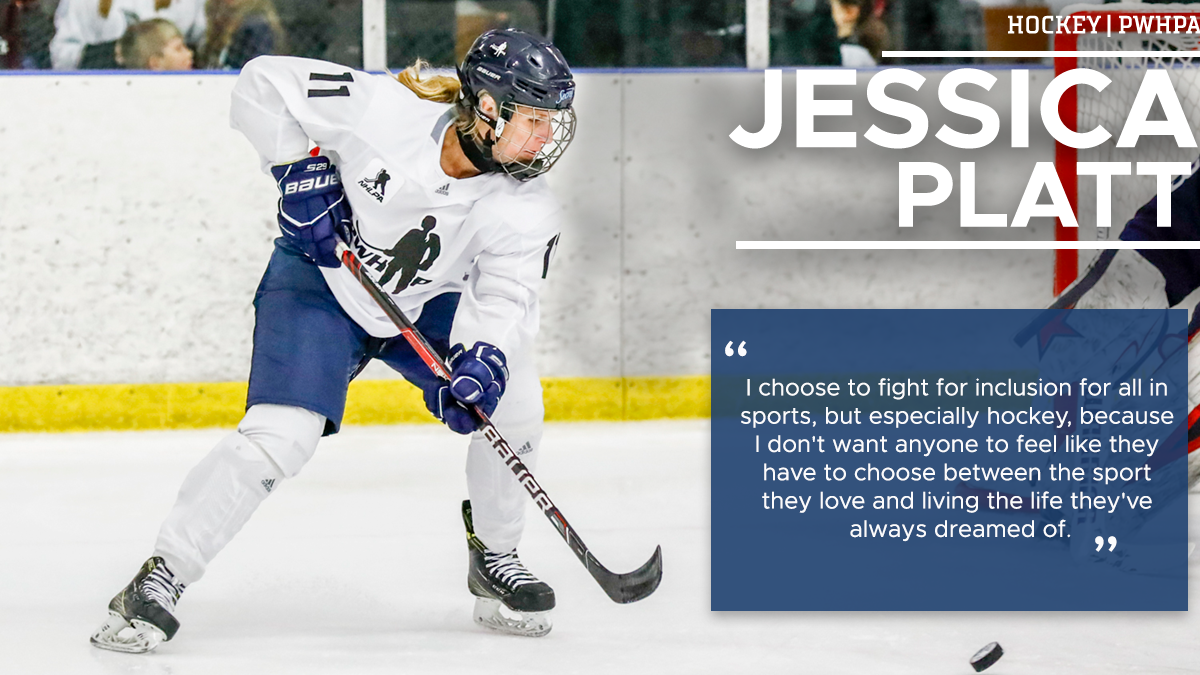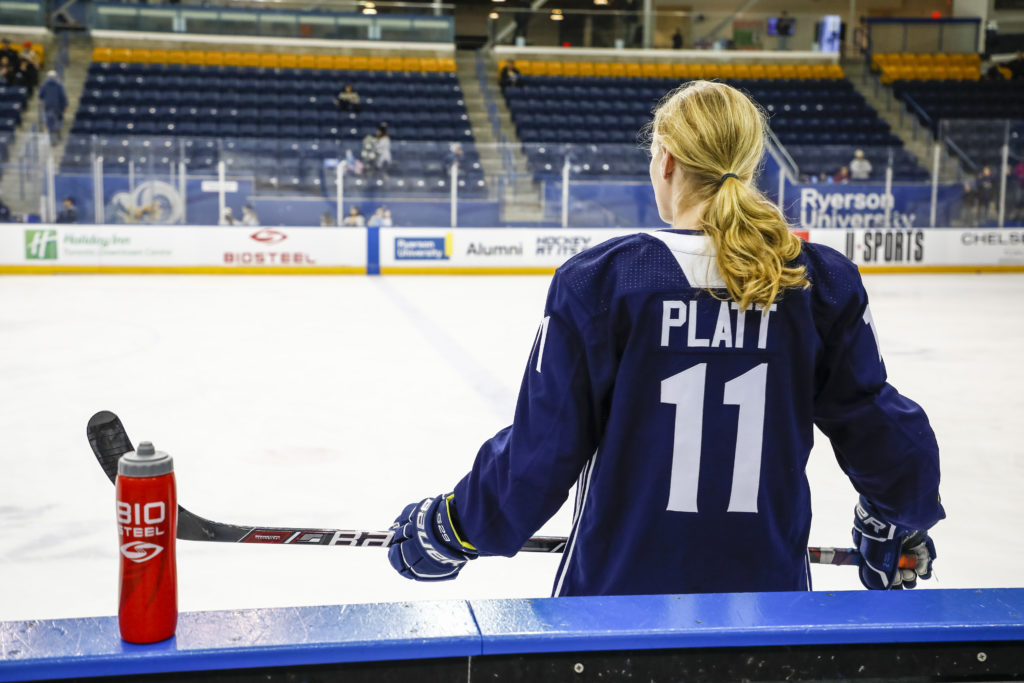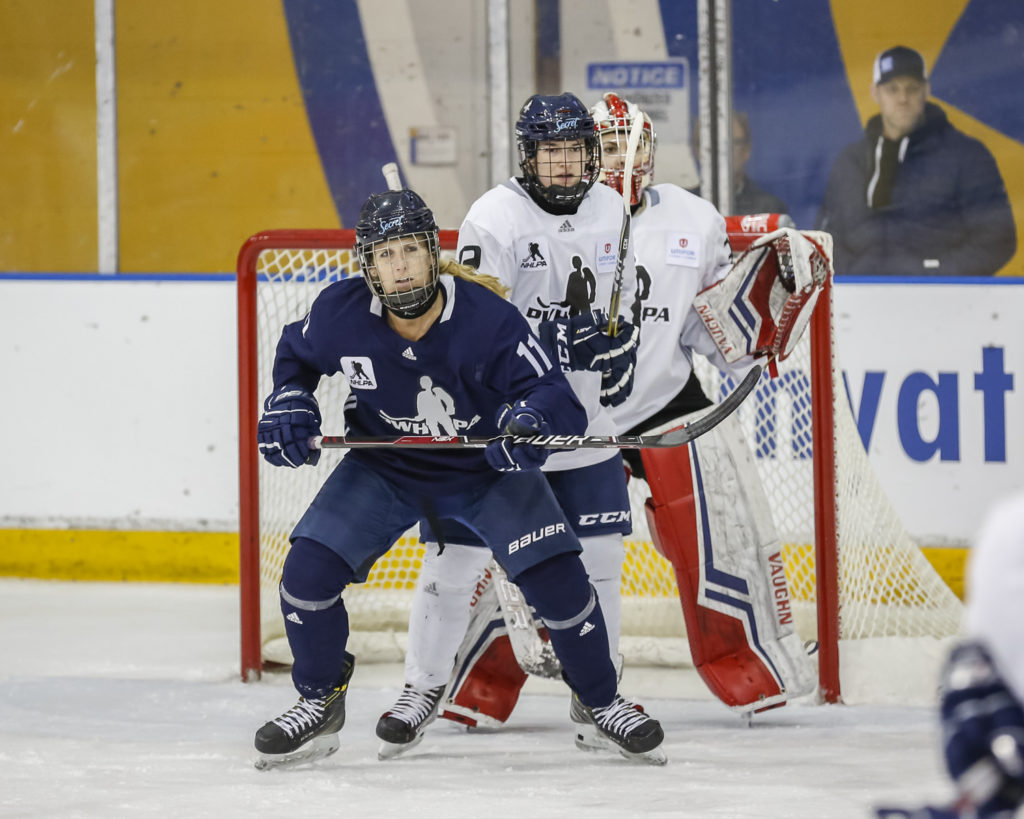Former Hockey Pro Jessica Platt: Showing Trans Youth What’s Possible

By: Jessica Platt, Athlete Ally Ambassador and former Toronto Furies/Canadian Women’s Hockey League player
I am a former professional hockey player. I played two seasons with the Toronto Furies in the CWHL (Canadian Women’s Hockey League) and last year I played with the PWHPA (Professional Women’s Hockey Players Association). I am also a transgender athlete. My participation in sport has been the focus of many conversations and arguments from people who believe I don’t belong in women’s sports simply because of how I was born, without knowing more about what I’ve been through and what a trans woman must go through to participate in elite sports.
I am from Brights Grove, Ontario. I grew up playing hockey, with my first strides being on a backyard rink. Quickly once I started playing I was asked to play rep (travel) hockey. Hockey was something that I loved more than anything in the world. When I was playing the game everything just came easy to me, with my dad saying I just seemed to know where everyone was on the ice. Hockey was my happy place for a while, but later in life it also caused me many issues when it came to accepting who I was. The culture in hockey when I grew up was toxic. I can’t count the amount of homophobic, sexist, misogynistic, or otherwise problematic comments I heard while I played men’s hockey. Early on, I was influenced to act a certain way, and I did because that’s what I thought society expected of me. Hockey was my happy place, on the ice everything was ok because I was only thinking about the game, but off the ice I was seriously struggling.
When the time came where people play in a men’s league or quit, I tried out mens league not wanting to give up the game, but after one season I knew I needed to hang up my skates and try to find a way to be happy with my life. That period of learning was a dark time where I grappled with my true identity and the identity I had created for myself over the years. Eventually making it through, I made the decision to transition, which ultimately saved my life. During my transition, I had an incredible support system. I even began to run and get into shape, something I had never had the motivation to do before. As I transitioned I was playing ultimate frisbee and I experienced firsthand the effects HRT has on your body as I went from being one of the fastest people on the field one summer, and the next summer struggling to keep up with people I could easily outrun before. Being the competitive person I am, this was difficult on me mentally, eventually though I adjusted to my body’s new normal.

Three years into my transition I got a job teaching kids to skate and play hockey which sparked my desire to play hockey again. Unfortunately I didn’t feel comfortable or safe entering into a shared change room, and so I held off. Once I was at a point where I considered my transition complete, about five years after I began, and felt comfortable in a change room setting, I started to search out how I could play again. I had no intention of playing professional — I just wanted to play in any way possible. I found a local women’s league that summer and decided to try it out. Week by week I quickly got better, to a point where I was excelling like I used to and the competitive athlete in me wanted to see how far I could go. Now that I was training, caring about my body and feeling motivated to be the best I could be, I wanted to really test myself. I had no idea what opportunities there were for women’s hockey players so I had to do my research, and find what was out there because it gets almost no publicity like the men’s game.
I found the CWHL, and decided to try out. I didn’t make the main roster my first year but was called up for 4 games. I had trained relentlessly leading up to training camp so that was disappointing, but I knew I could play with them. I trained relentlessly until the next year’s training camp and made the full squad the next year. From there, I made the decision to come out publicly, knowing that I would face extreme criticism from the men’s hockey community who knew nothing of trans athletes, except their preconceived notions, and also nothing about women’s hockey, except their ideas that any man is better than women’s hockey players. Both of which are largely incorrect. I knew I would face a lot of negativity from people hiding behind screens, but I also knew from my upbringing with no LGBTQ role models that I could do more good. As a young person struggling with my trans identity, I know that if I had seen a concrete example of a trans athlete succeeding, being happy, playing professional sports, and being unapologetically themselves, that would have changed everything for me.

I received nothing but support from the women’s hockey community everywhere: my coaches, teammates, opponents, the league, and fans. Nobody had anything negative to say to me. Women’s hockey should be looked at as an example of how to support the LGBTQ community in sports. I have never seen anything but acceptance for LGBTQ+ people in this truly special community. The negativity I face is from people who won’t change their opinion, no matter the information provided. They largely have the idea that men are inherently better, and consider a trans woman to have all the advantages men have because of testosterone without realizing that trans women go through surgical procedures, hormone replacement therapy and have to follow sets of rules aimed to level the playing field before being able to compete. This way of thinking takes away from the countless hours of hard work an athlete may put into their sport to be as good as they are.
I wonder why they believe that a trans woman would undergo surgery, years of hormone replacement therapy as well as face potential violence, murder (especially if you’re trans and BIPOC), hatred, discrimination, rejection from family and friends, and lose all their previous male privilege just to play women’s sports. Very few trans women “dominate” in sports, like I hear so often. Even if they manage to become elite athletes, there isn’t fame and fortune waiting for them like in men’s sports. Some trans women want to play sports, and trans women belong in women’s sports, because TRANS WOMEN ARE WOMEN.
Photos by Heather Pollock / Follow Jessica on Twitter and Instagram at @jplatt32
Want to receive stories like this in your inbox? Sign up here.